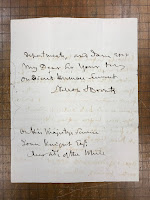 At a glance, this letter might seem like an off-putting mess of illegible scrawl, but you’d have to forgive the author; by the time he wrote it, he'd lost his dominant arm (and one of his eyes) to naval engagements during the Napoleonic Wars. Its humble appearance perhaps also belies the truly illustrious nature of its composer. Addressed to Admiral Sir John Knight requesting additional frigates for the British fleet and stressing the importance of maintaining good relations with North Africa, it was penned by the greatest British naval commander of all time, Vice Admiral Horatio Lord Nelson.
At a glance, this letter might seem like an off-putting mess of illegible scrawl, but you’d have to forgive the author; by the time he wrote it, he'd lost his dominant arm (and one of his eyes) to naval engagements during the Napoleonic Wars. Its humble appearance perhaps also belies the truly illustrious nature of its composer. Addressed to Admiral Sir John Knight requesting additional frigates for the British fleet and stressing the importance of maintaining good relations with North Africa, it was penned by the greatest British naval commander of all time, Vice Admiral Horatio Lord Nelson.The letter is dated to September 30, 1805, and was dispatched from HMS Victory, Nelson’s flagship, from which he commanded the British fleet. Less than a month later, Nelson would be dead, shot on the deck of the Victory at the legendary Battle of Trafalgar against Napoleon’s French and Spanish forces. Trafalgar was an astonishingly decisive victory for the British, affirming their dominance of the sea and crippling Napoleon’s navy - and his dreams of an invasion of Britain - permanently. While the strategy Nelson chose to employ against his enemy was not entirely novel, it was the combination of his decisive action, boldness, and willingness to trust in the effectiveness and discipline of his captains that defined his virtuosity of command.
However, the win was to come at a heavy price. A little over an hour after he raised the famous signal
 "ENGLAND EXPECTS THAT EVERY MAN WILL DO HIS DUTY" and opened the engagement, Nelson was shot by a French sniper. He died three hours later, long enough to hear of his victory over the French.
"ENGLAND EXPECTS THAT EVERY MAN WILL DO HIS DUTY" and opened the engagement, Nelson was shot by a French sniper. He died three hours later, long enough to hear of his victory over the French.It's almost difficult to wrap your head around just how popular Nelson was at the time of his death (even Churchill after WWII doesn’t match him) and how keenly his loss was felt. Considered by many to be the embodiment of the fundamentally British nature, coupled with a life packed with adventure, heroism and scandal, it may come as no surprise that Britain went Nelson-crazy after the death of the admiral. Taken in context, this letter becomes more than a nest of scribbles, more even than a request for frigates and food. As a part of the material culture surrounding the life of Britain’s greatest naval commander, it joins the ranks of the "Cult of Nelson", giving the viewer a tangible link to the essence of what it means to be British, and to be a hero.
To examine Nelson's penmanship for yourself, come to Rauner and ask for Ticknor 805530.1.
Posted for Whitney Martin '17.
No comments :
Post a Comment